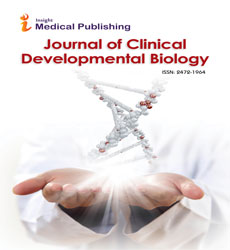Postpartum Depression: Causes and Treatment
Rakshitha Kotha
Rakshitha Kotha*
Department of Biochemistry, Osmania University, Hyderabad, Telangana, India
- *Corresponding Author:
- Rakshitha Kotha
Department of Biochemistry
Osmania University, Hyderabad, Telangana, India
Tel: +32-466-90-05-61
E-mail: raksh32311@gmail.com
Received Date: October 04, 2021; Accepted Date: October 18, 2021; Published Date: October 25, 2021
Citation: Rakshitha K (2021) Postpartum Depression: Causes and Treatment. J Clin Dev Biol. 6:03.
Perspective
Postpartum depression
The term "postpartum" refers to the period following childbirth. Within a few days of giving birth, most mothers experience the "baby blues," or a sense of sadness or emptiness. The new-born blues usually pass in 3 to 5 days for most mothers. You may have postpartum depression if your baby blues don't go away or you feel gloomy, hopeless, or empty for more than two weeks. It is not normal or expected for a mother to feel despondent or empty after giving birth.
Postpartum depression is a significant mental disorder that affects your behaviour and physical health and includes the brain. Sad, flat, or empty feelings don't go away if you have depression, and they might interfere with your day-to-day existence. You may feel disconnected from your baby, as if you are not its mother, or you may not love or care for it. These emotions might range from moderate to strong.
Anxiety problems can affect mothers during or after pregnancy. Depression is a typical complication following pregnancy. Postpartum depression affects one out of every nine new mothers.
Hormonal changes may be the cause of postpartum depression symptoms. The levels of the feminine hormones oestrogen and progesterone are at their peak during pregnancy. Hormone levels quickly return to pre-pregnancy levels in the first 24 hours after childbirth. This abrupt drop in hormone levels, according to researchers, could lead to depression. This is similar to hormone fluctuations before a woman's period, but the swings in hormone levels are far more dramatic.
Thyroid hormone levels may also diminish after childbirth. The thyroid is a tiny gland in the neck that aids in the regulation of how your body utilises and stores food energy. Thyroid hormone deficiency might lead to depression symptoms. If this condition is causing your symptoms, a simple blood test can determine whether it is the cause. If this is the case, your doctor may prescribe thyroid medication.
Other emotions may play a role in postpartum depression; many new mothers express the following emotions:
• After labour and delivery, you're exhausted.
• Experiencing fatigue as a result of a lack of sleep or a restless night's sleep.
• With a new baby, I'm feeling a little overwhelmed.
• They have reservations about their abilities to be a decent mother.
• Changes in work and home habits cause stress.
• Unrealistic desire to be the perfect mother.
• Grief at the loss of who they were before the baby is less appealing.
• A scarcity of spare time.
The following are some of the most frequent treatments for postpartum depression:
Therapy: During therapy, you talk to a therapist, psychologist, or social worker about ways to modify the way you think, feel, and act while you're depressed.
Medicine: Postpartum depression can be treated with a variety of medications. All of them require a doctor's or nurse's prescription. Antidepressants are the most prevalent category. Antidepressants can help alleviate depressive symptoms, and some can even be taken while breastfeeding. It can take many weeks for antidepressants to start functioning.
Esketamine: It is a type of drug used to treat depression, is administered as a nasal (nose) spray in a doctor's office or clinic. Esketamine has the potential to harm an unborn child. If you are pregnant or breastfeeding, you should avoid using esketamine.
Electroconvulsive therapy (ECT): It is a type of electroconvulsive (ECT). This can be used to treat postpartum depression in extreme circumstances.
Postpartum depression, if left untreated, can have a negative impact on your ability to parent.You have the option to:
• Insufficient energy.
• You're having problems focusing on both the baby's and your own demands.
• Feeling down in the dumps.
• Being unable to care for your child increases your chances of trying suicide.
Researchers believe that a mother's postpartum depression can have a long-term impact on her kid, causing:
• Delays in language development and learning difficulties.
• Bonding issues between mother and kid.
• Problems with behaviour.
• In pre-schoolers, shorter height and a higher risk of obesity are associated.
• Stress management issues and difficulties adjusting to school and other social circumstances.
Open Access Journals
- Aquaculture & Veterinary Science
- Chemistry & Chemical Sciences
- Clinical Sciences
- Engineering
- General Science
- Genetics & Molecular Biology
- Health Care & Nursing
- Immunology & Microbiology
- Materials Science
- Mathematics & Physics
- Medical Sciences
- Neurology & Psychiatry
- Oncology & Cancer Science
- Pharmaceutical Sciences
